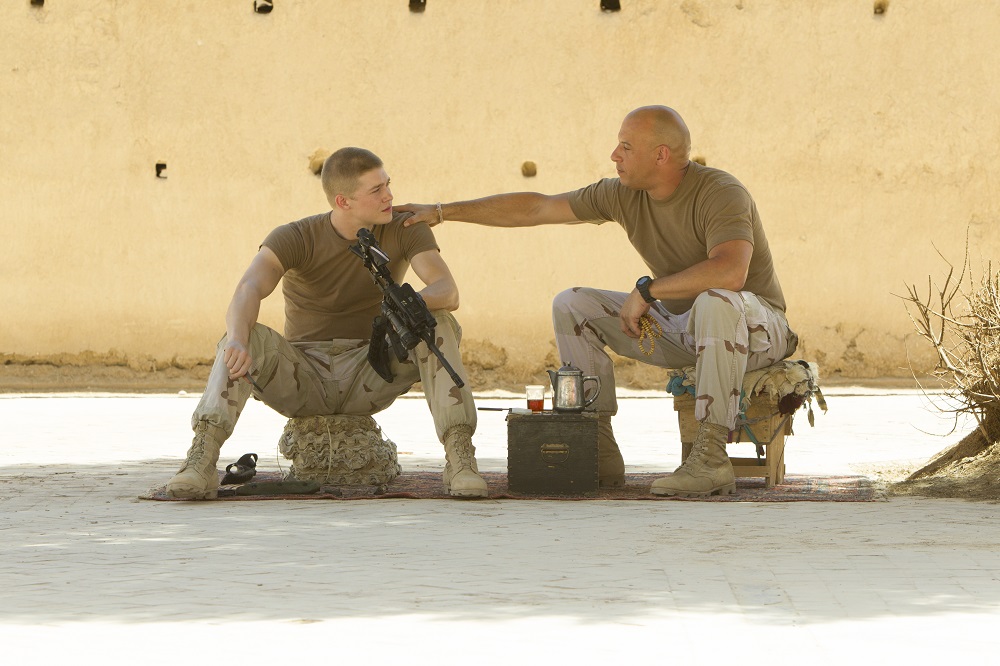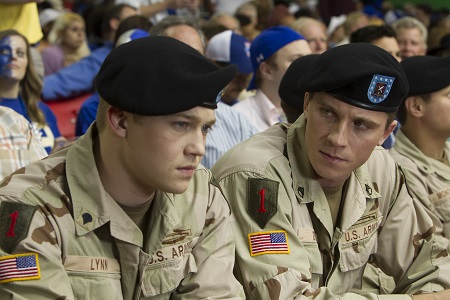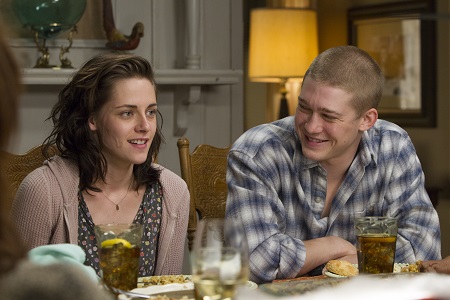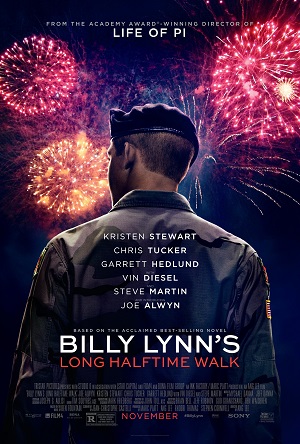
Billy Lynn’s Long Halftime Walk (2016)
by Sara Michelle Fetters - November 18th, 2016 - Movie Reviews
Didactic Billy Lynn a Long Walk of Social Commentary Treacle
It’s hard to know what to make of director Ang Lee’s latest 3-D dramatic extravaganza Billy Lynn’s Long Halftime Walk. Set in 2004 and based on the book by Ben Fountain, the movie is a stream-of-consciousness chronicle of 19-year-old Bravo Company soldier Billy (newcomer Joe Alwyn), he and the other members of his unit preparing to be recognized during the halftime show of a Thanksgiving Day professional football game as American heroes while sharing the stage with the members of Destiny’s Child. Interspersed are flashbacks and memories, most of them either centered on what transpired on a faraway Iraqi battlefield or back inside Billy’s Texas home having dinner with his family, notably conversations between him and his loving older sister Kathryn (Kristen Stewart).
That’s pretty much it. We are privy to conversations between Billy and his spiritual Sergeant (Vin Diesel), nicknamed “Shroom” for reasons I could never quite understand, while the pair is getting to know one another in Iraq. We witness Hollywood agent Albert (Chris Tucker) talk a mile-a-minute as he tries to package the Bravo soldiers’ story of sacrifice, duty, brotherhood and heroism into a movie deal. We listen to platitudes spouted by Texas billionaire and professional football team owner Norm Ogelsby (Steve Martin) while at the same time Sergeant Dime (Garrett Hedlund) does what he can to keep his men in line, knowing the lot are heading back overseas into harm’s way in just a few short days. We watch as Billy becomes entranced with cheerleader Faison (Makenzie Leigh), a bubbly innocent whose religious fervor is only dulled by her instant, wide-eyed devotion to the young soldier she believes has given himself over body and soul to both God and country asking nothing in return.
The problem is that the movie is a talky, didactic bore, moving from moment to moment and emotion to emotion with zero subtlety and even less grace. It hits the nail on the head over and over again, Jean-Christophe Castelli’s nonlinear script a lifeless hodgepodge of melodramatic clichés that are as annoying as they are obnoxious. Attempting to balance between antiwar sentiments while also celebrating the youngsters sent into battle not always knowing exactly what it is they are fighting for, the whole thing is a muddle, heavy-handed dirge that continually stumbles over itself again and again. In short, the movie is a giant mess, and at times it is impossible to tell what it was exactly that drew two-time Academy Award winner Lee to the story in the first place.
Thing is, the man is just too monumentally talented for the film to be anything close to a total loss. He coaxes a number of winning performances out of his cast, especially from the likes of Diesel, Tucker, Stewart and most notably Hedlund. Additionally, he stages a handful of truly bravura set pieces, not the least of which is the explosive halftime show, a variety of emotions running rampant as dancers cavort around, marching bands play and Destiny’s Child (we only ever see their collective backsides, Beyoncé Knowles, Kelly Rowland and Michelle Williams do not appear) perform, all while Bravo Company and Billy stand at the center of the stage wondering what exactly it is they are supposed to be doing. Even better is the Iraq skirmish that made the squad famous, the power of the sequence undeniable as each is forced to draw blood, all doing things they can barely live with themselves for having a hand in let alone feel capable of understanding why others want to make them heroes for doing no more than the job that was asked of them.
One gets the idea that Lee was aiming for the same sort of feeling he was able to generate with Life of Pi, utilizing technology in service of drama in order to immerse the audience into the psyche of his protagonist in a way that’s hypnotically intimate. Problem is, the emotions on display are much too obvious and far too stilted. Worse, they don’t feel real, their authenticity too manufactured and simplistic. While the film sadly did not screen for Seattle press in either the 120 fps frame rate or the 3-D format Lee intends it to be projected in, that doesn’t mean I couldn’t tell what he hoped to accomplish. The long takes, the way John Toll’s (The Thin Red Line) camera slowly moves down corridors, on battlefields and across Thanksgiving Day dinner tables, it’s all designed to showcase Billy’s shifting mental landscapes, putting the viewer inside his head whether they’d like to be there or not.
Again, as the studio decided against showing the movie in this fashion, whether Lee accomplishes what he set out to do I honestly cannot say. But I have great difficulty believing it would have mattered. While the technical aspects of the production are impressive, the psychological ones are anything but. It’s all too tired, too aggressively on point, the entire concept of restraint thrown out with the bathwater just so the director and his screenwriter can make their dryly moralistic points one after the other. It’s all a giant cacophony of artifice masquerading as something important and meaningful, making Billy Lynn’s Long Halftime Walk an annoying bit of social commentary treacle that’s virtually impossible to enjoy and even more difficult to sit through.
Film Rating: 1½ (out of 4)








